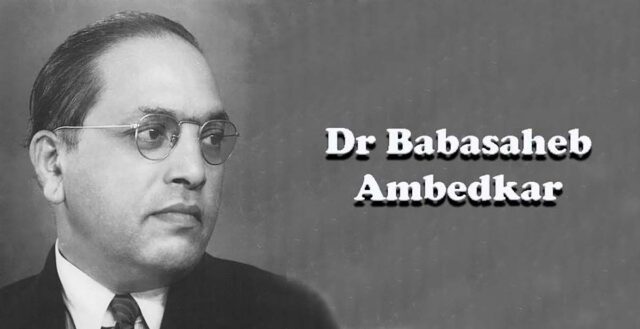Dr. Bhimrao Ramji Ambedkar, was one of the most prominent social reformers and political leaders in Indian history who needs no introduction. He was born on April 14, 1891, in Mhow, Madhya Pradesh. Ambedkar was a great scholar and is known for his contribution to the Indian Constitution.
Here is the brief information about his education, his efforts to draft the Constitution of India and initiatives to transform lives of people.
Education:
Dr. Ambedkar’s education began at the age of five when he started attending a local school. Later, he joined the Elphinstone High School in Bombay (now Mumbai), where he excelled academically. In 1908, he enrolled at Elphinstone College, where he studied economics and political science. In 1912, he graduated from Elphinstone College with a degree in economics and went on to study law at Gray’s Inn in London.
M.A. in Economics: After completing his Bachelor’s degree in Economics and Political Science from Elphinstone College in Bombay, Dr. Ambedkar obtained a master’s degree in economics from Columbia University in New York City in 1915. He was the first Indian to be awarded a doctorate in economics from a foreign university.
PhD in Economics: In 1927, he earned a PhD in economics from the University of London for his research on the problem of the rupee.
Barrister-at-Law: Dr. Ambedkar completed his law studies from Gray’s Inn in London and was called to the Bar in 1913. He was the first Indian to pursue a legal career in the United States.
D.Sc. in Economics: In 1952, the University of Columbia conferred upon Dr. Ambedkar the degree of Doctor of Science in Economics.
LLD from Columbia University: In 1952, Dr. Ambedkar was also awarded the degree of Doctor of Laws by Columbia University.
Posthumous Honorary Doctorate: In 1990, the University of Paris awarded Dr. Ambedkar a posthumous honorary doctorate in recognition of his contributions to the field of social justice.
In addition to these degrees, Dr. Ambedkar also earned numerous other academic honors and distinctions during his lifetime, including several scholarships and fellowships. His academic achievements were a testament to his exceptional intellect and his commitment to education and scholarship.
Efforts For Making Constitution of India
Dr. B.R. Ambedkar was the chairman of the Constitution Drafting Committee and played a pivotal role in the preparation and drafting of the Constitution of India. Here are some of the efforts and preparations that Dr. Ambedkar made to make the Constitution of India:
Constituent Assembly: The Constituent Assembly was established in 1946 to draft the Constitution of India. Dr. Ambedkar was a member of the Assembly and was appointed as the chairman of the Constitution Drafting Committee.
Study of Constitutions of other countries: Dr. Ambedkar studied and analyzed the constitutions of various countries, including the United States, Canada, Ireland, and Australia. He also studied the Government of India Act of 1935, which was the governing document of British India before the adoption of the Constitution.
Drafting Committee: Dr. Ambedkar worked closely with the other members of the Constitution Drafting Committee to draft the Constitution. The Committee was responsible for creating a framework for the Constitution and incorporating the provisions that would govern the country’s political and legal systems.
Consultation with experts: Dr. Ambedkar consulted with several legal and constitutional experts, including Sir Ivor Jennings, to ensure that the Constitution was legally sound and comprehensive.
Focus on Fundamental Rights: Dr. Ambedkar emphasized the need to include fundamental rights in the Constitution to protect the rights of all citizens. The Constitution of India guarantees several fundamental rights, including the right to equality, freedom of speech and expression, and the right to life and liberty.
Focus on Social Justice: Dr. Ambedkar was a strong advocate for social justice and ensured that the Constitution included provisions for the upliftment of marginalized communities. He was instrumental in drafting provisions for affirmative action and reservations for the Dalits, Scheduled Castes, Scheduled Tribes, and Other Backward Classes.
Overall, Dr. Ambedkar’s efforts and preparations were critical in the drafting of the Constitution of India. His focus on fundamental rights and social justice ensured that the Constitution was inclusive and equitable for all citizens. The Constitution of India was adopted on November 26, 1949,
Social Activities
Ambedkar’s association with Mumbai was significant as he spent much of his life in the city and carried out many of his social activities here. Here are some of his notable initiatives:
Establishment of Bahishkrit Hitakarini Sabha: In 1924, Ambedkar founded the Bahishkrit Hitakarini Sabha, an organization aimed at promoting the welfare of the Dalit community, also known as the “untouchables.” The organization held its first meeting in Mumbai and went on to become a prominent voice for Dalit rights in the country.
Campaign against untouchability: Ambedkar was a vocal opponent of the caste system and untouchability. He launched several campaigns against untouchability, including a temple entry movement in the 1930s that aimed to end the practice of barring Dalits from entering Hindu temples.
Fight for reserved seats in the Legislative Council: In 1926, Ambedkar led a successful campaign for reserved seats for the Dalit community in the Bombay Legislative Council, which marked a significant milestone in the fight for political representation for marginalized communities.
Launch of the newspaper “Mooknayak”: Ambedkar launched the newspaper “Mooknayak” in Mumbai in 1920, which became a platform for him to raise his voice against social injustices, caste discrimination, and political repression.
Founding of the Independent Labour Party: In 1936, Ambedkar founded the Independent Labour Party, which was aimed at fighting for the rights of workers and peasants in Mumbai and other parts of Maharashtra.
These are just a few examples of Ambedkar’s social activities in Mumbai, which played a crucial role in the struggle for social justice and equality in India.








